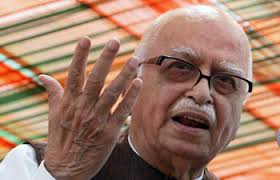 New Delhi, Jun 11: The Bharatiya Janata Party leadership is hardening its stand on LK Advani, but the party patriarch and his camp are not giving up the fight. BJP President Rajnath Singh will be in Banswara in Rajasthan, his absence from the capital at the time of a crisis seems to be intended to send out the message that it is business as usual in the BJP.
New Delhi, Jun 11: The Bharatiya Janata Party leadership is hardening its stand on LK Advani, but the party patriarch and his camp are not giving up the fight. BJP President Rajnath Singh will be in Banswara in Rajasthan, his absence from the capital at the time of a crisis seems to be intended to send out the message that it is business as usual in the BJP.Speaking to the media, Rajnath Singh took pains to explain that the RSS had no hand in the decision to promote Narendra Modi as the party's campaign committee chief for the 2014 Lok Sabha elections. BJP spokesperson Prakash Javadekar also said that Advani's resignation hasn't been accepted and that all party leaders are in touch with Advani.
Among other key leaders Arun Jaitley is going abroad on Tuesday. Narendra Modi remained in Gujarat and addressed a rally in Ahmedabad on Tuesday.
Sources close to the leadership say Modi's elevation has been ratified by the party's National Executive and individuals can't change it.
But the Advani camp is not budging. BJP leaders Sushma Swaraj, Uma Bharti and Jaswant Singh held talks with Advani on Tuesday. Uma Bharti also met senior Sushma Swaraj before meeting Advani. Sushma Swaraj said Advani was not angry and added that there was no question of him withdrawing his resignation as it was already rejected by the BJP.
"The BJP should come up with solutions to the issues raised by Advaniji. This should happen in the interest of the party and the nation," Jaswant Singh said.
Former BJP President Nitin Gadkari also met Advani. "Advaniji is a very senior leader, advisor and the founder of the party. His decision is unfortunate. We will try and request him to withdraw his resignation. We're confident that he will listen to us," Gadkari said.
A day after the National Executive sent out a clear message with the elevation of Narendra Modi, LK Advani quit all posts in the party on Monday. In the one-page resignation, Advani said, "For some time I have been finding it difficult to reconcile either with the current functioning of the party, or the direction in which it is going. Most leaders of ours are now concerned just with their personal agendas." Advani had skipped the three-day deliberations of the party in Goa over the weekend citing health reasons. This was the first time Advani had stayed away from the National Executive and the office bearers' meeting prior to it.
Advani said the BJP was no longer the "same idealistic party" created by Shyama Prasad Mookerjee, Deendayal Upadhyaya, Nanaji Deshmukh and Vajpayee. "All my life I have found working for the Jana Sangh and the Bharatiya Janata Party a matter of great pride and endless satisfaction to myself," said Advani in his resignation letter.
"I have decided, therefore, to resign from the three main fora of the party, namely, the National Executive, the Parliamentary Board, and the Election Committee. This may be regarded as my resignation letter," the letter said.





Comments
Add new comment